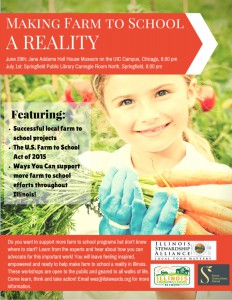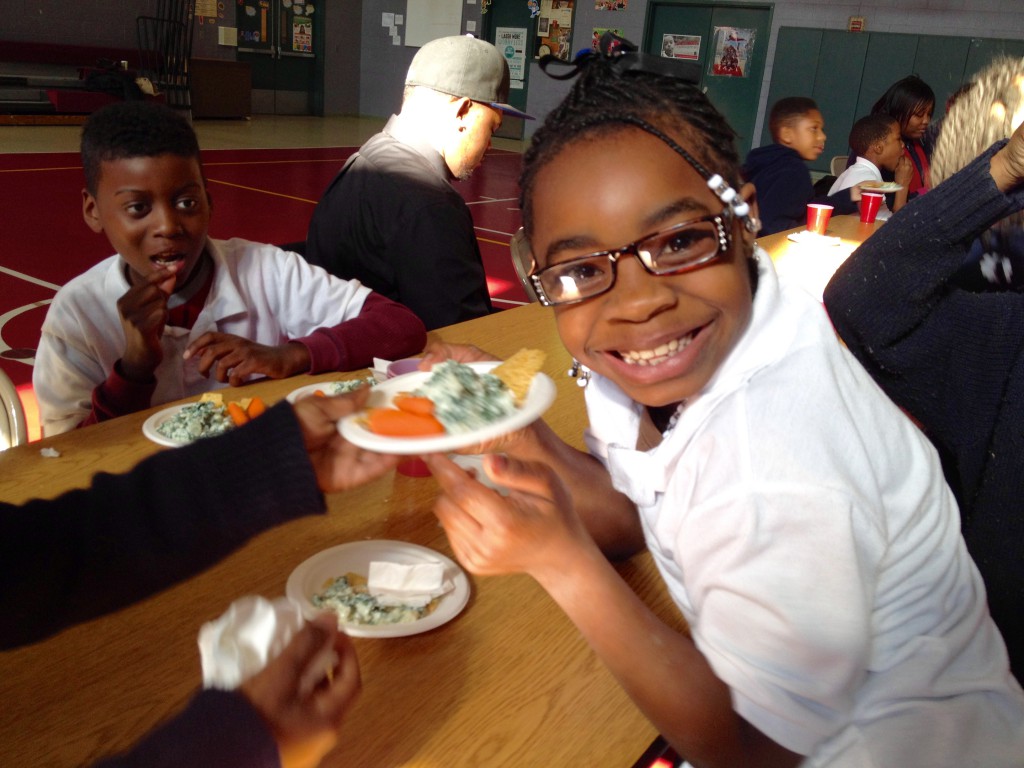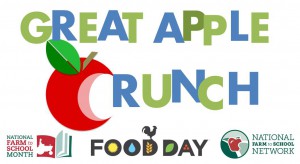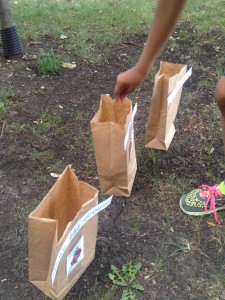 This article is being re-posted from the original, written by Molly Gleason at the Illinois Stewardship Alliance.
This article is being re-posted from the original, written by Molly Gleason at the Illinois Stewardship Alliance.
The Illinois Farm to School Network and Illinois Stewardship Alliance are hosting two free public programs and workshops highlighting successful Springfield and Chicago-area farm to school projects and how to get involved with making farm to school a reality in Illinois. The first program will be held on June 29th at the Jane Adams Hull House Museum on the University of Illinois Chicago Campus at 6:00pm and the second will be held July 1st at 6:00 p.m. in the Springfield Public Library Carnegie Room North.
Fueled by parents, doctors and teachers who are concerned that now over 30% of all children in the U.S. are overweight or obese, and combined with the fact that farmers receive only approximately 16 cents of every food dollar; more and more communities are turning to farm to school programs as a win-win for everyone involved. Farm to school programs across the country and in Illinois are bringing healthier, fresh food to kids through school gardens and local food procurement, instilling a greater appreciation for U.S. agriculture among school children, teachers and parents, and putting more money in the pockets of farmers.
The Chicago workshop will include a panel discussion featuring successful farm to school projects from the Chicago area. Panelists include Zack Grant of the University of Illinois Extension and Drew Thomas of the Chicago Public School among others. The Chicago Public School system has been a leader in Illinois when it comes to farm to school programs, whether that is through the installation of school gardens or the significant efforts to source food from local farms to be included on the menu in school cafeterias.
The Springfield workshop will follow a similar layout with panelists including local farmer Andy Heck, the food service director for New Berlin School district, and staff from Generation Healthy Kids. Generation Healthy Kids (GenH Kids) is a leader in the Springfield area when it comes to installing gardens at schools and providing educational programs for kids and parents to learn about healthy eating and local food.
“With farm to school programs kids win, farmers win, and communities win,” said Wes King, executive director of Illinois Stewardship Alliance. “The goal of this workshop is to highlight successful farm to school projects that could be models for others while also educating folks on how they can support positive federal policy that enables more farm to school initiatives.”
In addition to focusing on successful farm to school projects, the workshop aims to educate attendees about the important role federal policy plays in structuring school feeding programs.
Approximately every 5 years or so Congress passes and the President signs into law a large piece of legislation generically known as the Child Nutrition Reauthorization Act, or CNR, which funds and structures the nation’s school feeding programs; the Special Supplemental Nutrition Program for Women, Infants, and Children known as WIC; and the United States Department of Agriculture’s national Farm to School program. This year the National Farm to School Network and the National Sustainable Agriculture Coalition have teamed up with a bipartisan team of senators and representatives to introduce legislation titled the U.S. Farm to School Act of 2015 that aims to expand the USDA’s Farm to School programs.
Introduced by Senator Patrick Leahy, Senator Thad Cochran, Representative Jeff Fortenberry and Representative Marcia Fudge, The Farm to School Act of 2015 (S. 569/H.R. 1061), if included in the final Child Nutrition Reauthorization Act, would triple funding for the USDA Farm to School grant program and clarify eligibility for the program to include summer and after school feeding programs. The Making Farm to School a Reality workshop will include more information about The Farm to School Act of 2015 (S. 569/H.R. 1061) and how to support local and national efforts to see that it is adopted potentially giving farm to school programs in Illinois the kind of resources they need and deserve.




